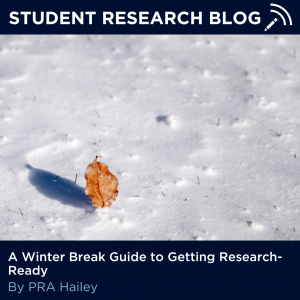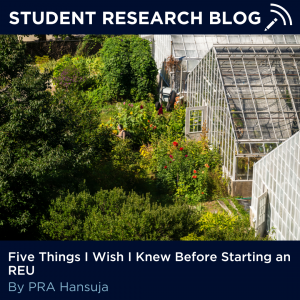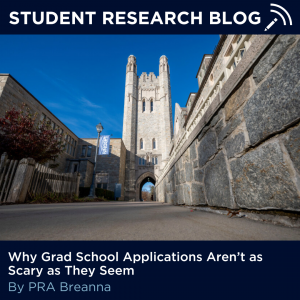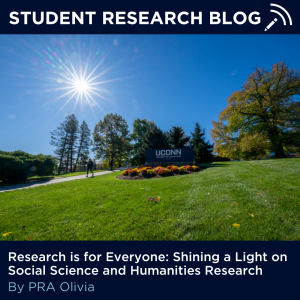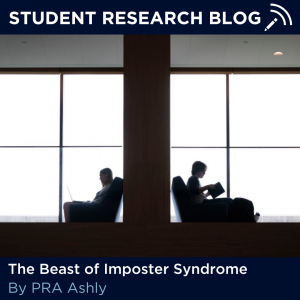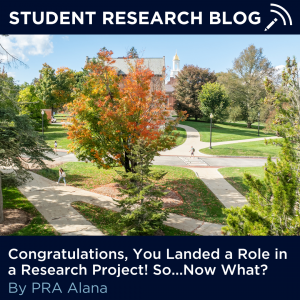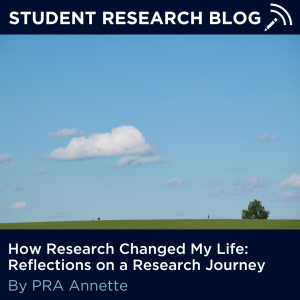By Brielle Pierre Philippe, Peer Research Ambassador
The thing that usually gets everyone started on their research journey is passion–that spark of curiosity or excitement that fuels you to take all the necessary steps to find, connect with, and join a lab that aligns with your personal interests. Your “what-ifs” take shape before your eyes, and suddenly, all the questions you once had spinning around your head can be explored right in front of you.
I know this feeling. I remember this feeling. I remember what a rush it was to attend my weekly lab meetings with uncontainable anticipation, and I remember leaving feeling astonished and eager. I couldn’t wait to get my hands on my first project, and I was hungry to learn and contribute to the research in my field. The excitement of discovery, getting lost in the literature, and learning new techniques–these are all things that any new researcher would look forward to, and rightfully so!
Most of the time, I still feel that way. However, I would be lying if I said there were never moments when motivation was low—and I believe that would stand true for any researcher. The truth about research is that it can’t be 100% exciting all the time. There will be moments when things begin to lull. Data collection may feel tedious, results may come back inconclusive, there might be long analysis days, or you may just get stuck waiting on IRB approval.
Recently, one of my close friends told me all the cells she was growing this semester just decided to die, and now she has to start over with a whole new batch. Of course, things like that are terrible, but they can happen. In moments like these, passion may fade.
If this happens to you, know that it’s normal! Research is a journey, and your relationship with it may not be linear. There have been many times when I sat at a desk with the smell of wet rat in my nostrils for over two hours, typing in all the data we had collected into a spreadsheet, and sneezing nonstop because I had developed a slight allergy to the very same animals that I handled almost every day. Even if you love your project (and trust me, I love mine), motivation can drop–and that’s when persistence becomes essential.
The idea that researchers are always feeling eager and passionate is a myth. In truth, consistency matters more than constant excitement.
The Role of Persistence
I spent an entire semester of my sophomore year collecting data for my project, and the process required a lot of commitment. My partner and I would go into the lab nearly every day at the same time to collect data over a period of many weeks.
By the end of data collection, I was exhausted and ready to move on to analysis. However, when it came time to analyze the data, it looked like there wouldn’t be any significant results from the project I had poured my blood, sweat, and tears into. I was distraught.
Still, I decided to keep my head up and persist. I was able to present my research at a conference and feel proud of the work I had accomplished. After talking it over with my PI, we decided to rerun one of the experiments the following year to see if anything had changed. Now, as I’ve begun analyzing the new data, things are coming back significantly! Now, I understand that all my hard work was worth it, and even if I hadn’t gotten significant results the second time around, I would appreciate all I have accomplished.
What Persistence Looks Like in Research
Persistence in research can take many forms—revising, reanalyzing, refocusing, asking for feedback, and managing your time effectively. Passion gives meaning to persistence, and persistence strengthens passion over time.
After that tough stretch, I rediscovered my excitement. I also learned something important: while we often pour so much of ourselves into our research, we have to be careful not to give so much that we burn out or give up. Both passion and persistence are learned and cultivated; they are not innate personality traits.
Balancing these two qualities has changed my understanding of research, and taught me that it’s not just about outcomes, but about curiosity, commitment, and most of all, growth!
So, to new researchers: don’t worry if your passion wavers. Persistence will carry you through until it reignites!
